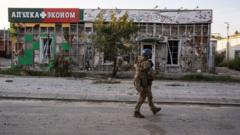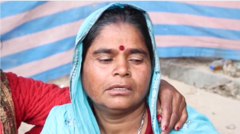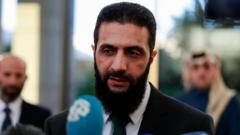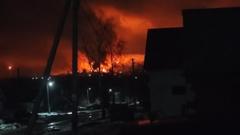The ongoing war in Ukraine has led Lithuania to re-examine its cultural landscape, sparking conflict over the performance of Tchaikovsky's "Nutcracker" amidst shifting political sentiments.
A Cultural Conflict: The Nutcracker's Polarizing Return in Lithuania

A Cultural Conflict: The Nutcracker's Polarizing Return in Lithuania
As the war in Ukraine reshapes cultural ties, Lithuania debates the role of Tchaikovsky's music.
In a poignant reflection of ongoing tensions due to the war in Ukraine, Lithuania's National Opera and Ballet Theater has found itself at the center of a cultural debate over the exclusion of Tchaikovsky's beloved holiday classic, "The Nutcracker." Two years ago, Lithuania pledged solidarity with Ukraine by declaring a "mental quarantine" on Russian culture, leading to the cancellation of performances of works by the controversial composer.
This decision sparked discontent among patrons, but it wasn’t until a new administration took power that tensions resurfaced. Newly appointed culture minister Sarunas Birutis expressed his affection for Tchaikovsky's music, claiming there was no concern that enjoying a quintessential Christmas ballet could lead to pro-Kremlin sentiments. His remarks ignited a substantial backlash from staunch supporters of Ukraine and rekindled a divide between generations on the relationship between culture and politics during wartime.
Supporters of a more inclusive approach to the arts argue that banning works based on nationality undermines the potential of culture to foster unity and transcends political divisions. Amidst this debate, many theatergoers express nostalgia for Tchaikovsky’s enchanting melodies, demonstrating the complexities of patriotism entwined with artistic expression. The clash in views highlights the broader struggle within the region as the impact of war continues to permeate cultural discussions, challenging the role of art in society amidst geopolitical conflicts.
This decision sparked discontent among patrons, but it wasn’t until a new administration took power that tensions resurfaced. Newly appointed culture minister Sarunas Birutis expressed his affection for Tchaikovsky's music, claiming there was no concern that enjoying a quintessential Christmas ballet could lead to pro-Kremlin sentiments. His remarks ignited a substantial backlash from staunch supporters of Ukraine and rekindled a divide between generations on the relationship between culture and politics during wartime.
Supporters of a more inclusive approach to the arts argue that banning works based on nationality undermines the potential of culture to foster unity and transcends political divisions. Amidst this debate, many theatergoers express nostalgia for Tchaikovsky’s enchanting melodies, demonstrating the complexities of patriotism entwined with artistic expression. The clash in views highlights the broader struggle within the region as the impact of war continues to permeate cultural discussions, challenging the role of art in society amidst geopolitical conflicts.





















